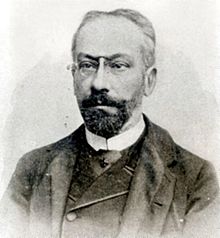António José Enes
| António José Enes | |
|---|---|
 |
|
| Born | 15 August 1848 Lisbon, Portugal |
| Died |
6 August 1901 (aged 52) Sintra, Portugal |
| Nationality | Portuguese |
| Occupation | Politician and writer |
António José Enes (15 August 1848 – 6 August 1901), commonly known as António Enes, was a Portuguese politician and writer.
A member of the progressive political and 1870s literary movement in Portugal, Enes's life is notable for his achievements in several fields; by the time of his death he had worked across three continents as a journalist, dramatist, librarian, government minister, colonial administrator and diplomat.
Enes wrote a controversial anti-clerical drama, "Os Lazaristas", and defended in 1870 the concept of a 'United States of Europe', fearing that Portugal would be absorbed by Spain.
As a writer, politician, and later as High Commissioner in Portuguese Mozambique, Enes was a defender of Portugal's colonial possessions in Africa in the face of twin threats from an expansionist and aggressive British Empire and native uprisings.
The town of Angoche in Mozambique was in the colonial era renamed 'António Enes' after him: the name of the town reverted to Angoche in 1976 following Portuguese decolonisation.
António Enes was born, the son of a clerk, in modest surroundings on the third floor of a house in Lisbon. He was a sickly child and health problems were to continue throughout his life. He studied at a Lazarist college in Santo Antão before attending the Liceu Nacional in Lisbon, completing his studies with a thesis in the Faculty of Letters on the Religious Philosophy of Egypt.
As a student Enes became allied with the "generation of the 70s" – the name given to a movement dedicated to political liberalism and realism in art – other prominent members included Eça de Queiroz, Antero de Quental, Batalha Reis and Oliveira Martins. This political and literary affiliation shaped the rest of his career.
Following initially a career in commerce, Enes found that the tranquil life of an office-worker did not suit him and he moved into journalism at the end of the 1860s, beginning his career as a literary critic on the 'Jornal do Comercio.'
Enes became allied with the liberal, republican mood alive in Portugal in the 1870s. He joined the Historical Party, which, in 1876 was to become the Progressive Party. This resulted in his collaboration in journals where he could express and defend his political ideas.
...
Wikipedia
